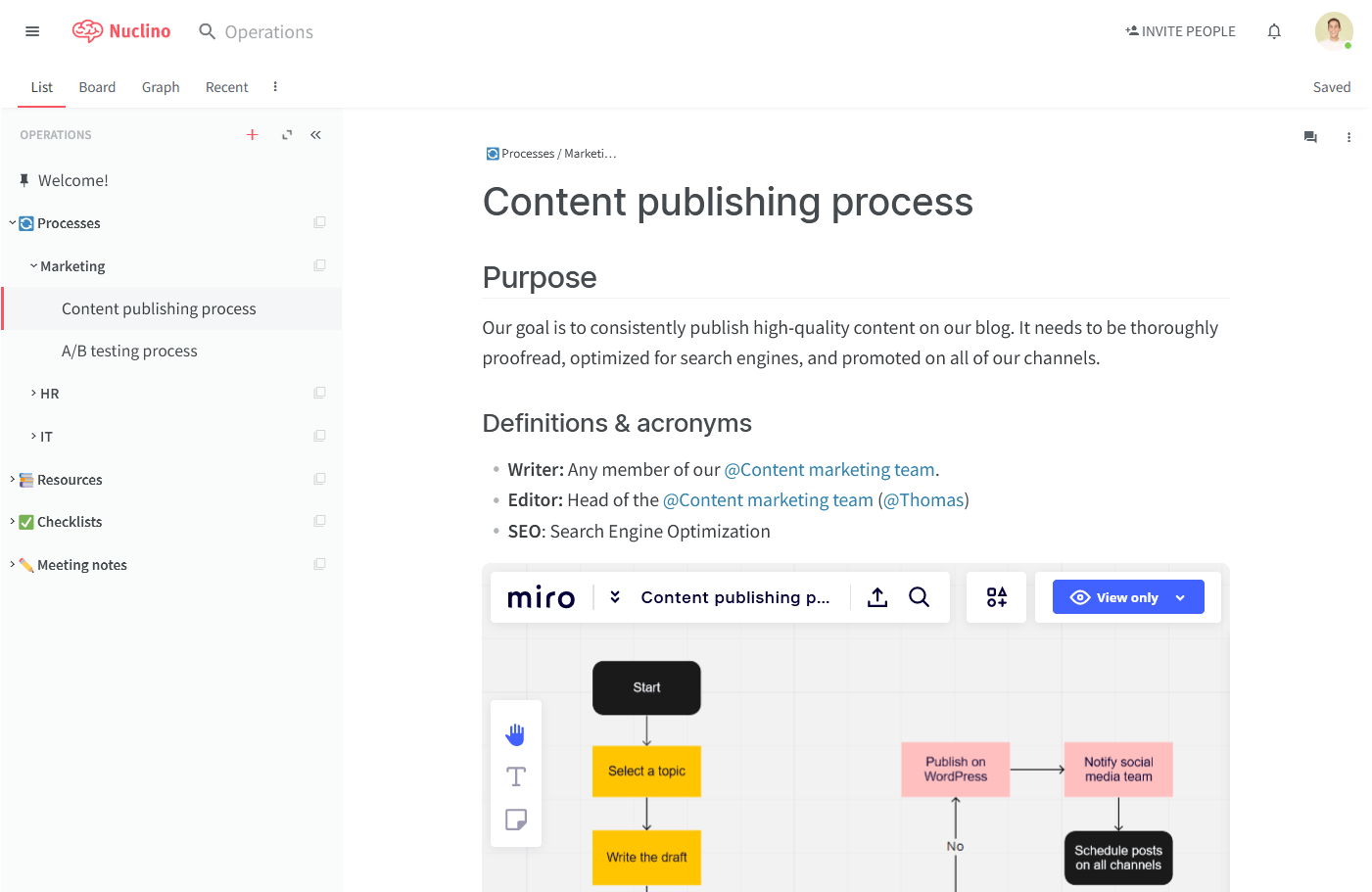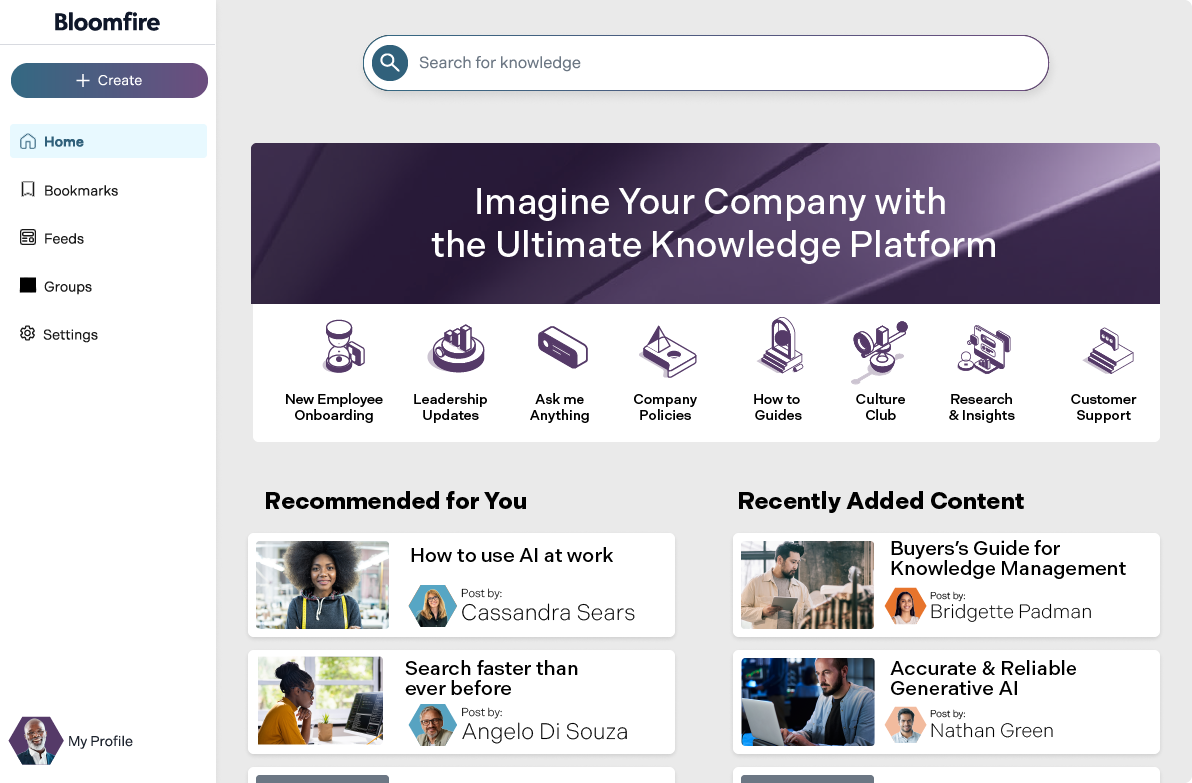Knowledge management has always been an uphill battle for organizations, with traditional methods such as paper files, emails, and spreadsheets often creating more chaos than clarity.
But with AI knowledge management software, all that changes!
It offers a robust solution by centralizing knowledge, automating organization, and making search functions smarter. With features like intelligent search, and personalized content recommendations, these tools boost productivity and collaboration, helping teams quickly access the information they need.
In this blog, we’ll explore the top features, major benefits, and emerging trends in AI-powered knowledge management software, showing you how these advancements are transforming organizations worldwide.
What Impact Does AI Have on Knowledge Management?
AI and knowledge management are redefining the sharing of information within organizations. AI’s integration into knowledge systems leads to greater efficiency, personalization, and data-driven insights. Let’s examine how AI impacts knowledge management.
Improved Knowledge Retrieval & Access
AI can significantly improve the way knowledge is retrieved by implementing advanced search algorithms, natural language processing (NLP), and machine learning. These technologies enable knowledge management systems to provide more accurate, relevant, and context-aware results, making it easier for employees to find the information they need quickly.
AI-driven systems can also learn from user interactions, continuously improving the accuracy of search results and reducing the time spent on manual searches.
Personalized Knowledge Sharing
AI enables personalized recommendations for employees by analyzing their activities, preferences, and work patterns. By understanding individual user needs, AI can suggest relevant content, documents, and experts, thus facilitating more efficient knowledge sharing.
This tailored approach ensures that employees are provided with the most useful resources specific to their role, expertise, or current project, promoting better decision-making and productivity.
Automated Content Creation & Organization
AI can automate various content creation and organization tasks within knowledge management systems. For instance, AI tools can generate reports, summaries, and FAQs from existing knowledge bases, reducing manual efforts.
Furthermore, AI can categorize and tag content automatically, ensuring that it is well-organized and easily searchable. This helps maintain up-to-date knowledge repositories and reduces the burden on knowledge managers.
Improved Collaboration & Communication
AI tools like chatbots and virtual assistants facilitate real-time communication and collaboration among team members, even across different locations. AI fosters a more collaborative work environment by providing instant access to information, answering questions, and helping with routine tasks.
This can lead to faster problem-solving and decision-making, as employees can focus more on complex tasks rather than routine information gathering.
Advanced Data Analytics & Insights
AI-powered analytics tools can analyze large volumes of data within knowledge management systems, uncovering trends, patterns, and insights that might otherwise go unnoticed.
These insights can help businesses identify knowledge gaps, monitor the effectiveness of knowledge-sharing practices, and understand how knowledge is being utilized across the organization.
As a result, AI helps organizations make data-driven decisions to improve overall knowledge management strategies and ensure that valuable information is effectively utilized.
How AI Is Used in Knowledge Management
AI has become a transformative force in knowledge management, improving the way organizations create, organize, and deliver information. Here are five key ways AI is used in knowledge management:
Quick, Error-Free Content Creation with AI
AI is transforming knowledge management by enabling quick, error-free content creation. With advanced built-in prompts and the ability to automatically summarize existing articles, the AI writer feature streamlines the content creation process. This ensures not only accuracy and consistency but also saves time, allowing teams to focus on more strategic tasks.
By leveraging AI, organizations can effortlessly generate high-quality knowledge resources, improving efficiency and keeping content up-to-date and relevant. This technology boosts productivity, making it essential for managing and scaling knowledge efficiently.
Automating Content Categorization & Tagging
AI can streamline the process of organizing knowledge by automatically categorizing content and applying relevant tags. Natural Language Processing (NLP) algorithms analyze documents, articles, and FAQs, understanding their content and context and tagging them appropriately.
This reduces manual effort and ensures that information is easily searchable and accessible, enhancing the efficiency of knowledge management systems.
Improved Search & Retrieval
AI-powered search engines in knowledge management systems go beyond traditional keyword-based searches. By utilizing AI techniques like machine learning and NLP, these systems can understand user queries more contextually and offer more accurate, relevant search results.
AI can also rank search results based on the user’s behavior, preferences, or past interactions, leading to faster and more efficient retrieval of information.
Personalized Knowledge Delivery
AI can analyze user behavior, learning preferences, and historical data to offer personalized content recommendations within a knowledge base. This creates a more tailored experience, as the system suggests the most relevant articles or resources based on the individual user’s needs.
This personalization helps users quickly access information that aligns with their role or current tasks, increasing productivity and reducing search time.
Chatbots for Knowledge Access & Support
AI-powered chatbots can serve as virtual assistants in knowledge management systems. They can answer user queries, guide users to relevant resources, and provide 24/7 support. By using machine learning algorithms, chatbots become smarter over time, learning from interactions to improve their responses.
This capability helps businesses provide immediate assistance and ensures that users have continuous access to critical knowledge without waiting for human intervention.
Predictive Analytics for Knowledge Gaps
AI can be used to identify knowledge gaps within an organization by analyzing patterns in data and user interactions. By tracking how often certain topics or questions arise, AI tools can predict areas where additional knowledge may be needed and recommend the creation of new content.
This proactive approach helps companies maintain up-to-date and relevant knowledge bases, preventing information silos and ensuring that employees have access to comprehensive resources.
What Are the Key Features of AI Knowledge Management Software?
AI knowledge management software is reshaping how organizations handle and distribute knowledge. Here are six key features that highlight AI’s impact on knowledge management.
1. Effortless, Accurate Content Generation
The AI Writer feature enables you to create error-free content quickly, thanks to its built-in prompts. It also helps by summarizing existing articles, allowing you to update or repurpose content with ease. Whether drafting new articles or refining current ones, this tool ensures your content is accurate, concise, and ready to publish in no time.
Plus, it improves productivity by streamlining the writing process, reducing the need for multiple revisions. With AI Writer, you can effortlessly maintain a consistent tone and style across all your content.
2. Smart Content Organization & Categorization
AI-powered knowledge management software automatically categorizes and organizes content based on its context and relevance. Using advanced algorithms like Natural Language Processing (NLP), the software can understand the meaning of articles, documents, and FAQs and tag them with appropriate keywords or labels.
This ensures that information is easily searchable and organized, reducing the manual effort involved in content management and improving content discoverability for users.
3. Contextual & Intelligent Search Capabilities
Unlike traditional keyword search, AI-driven search capabilities use machine learning and NLP to understand user intent and context. The software can provide more accurate search results by considering factors like past behavior, preferences, and contextual clues from the query.
This feature significantly enhances the speed and accuracy of finding relevant information, allowing users to spend less time searching and more time using the knowledge.
4. Automated Knowledge Base Creation
AI tools can analyze existing documents, emails, and other forms of communication to create knowledge base articles automatically. Using text mining and NLP, the software identifies key concepts and generates structured articles without the need for manual writing.
This feature helps organizations quickly build a comprehensive knowledge repository while ensuring consistency and accuracy across all content.
5. Personalized Knowledge Recommendations
AI-powered systems can learn from user behavior and preferences to provide personalized recommendations for articles, resources, or training materials.
This feature uses data on how employees interact with content to suggest relevant knowledge based on their roles, tasks, and past searches. By delivering tailored content, organizations can improve user engagement and efficiency in finding the right information.
6. AI-Driven Chatbots for Instant Knowledge Access
AI chatbots integrated into knowledge management systems offer real-time assistance by answering queries, guiding users to relevant resources, and providing troubleshooting support. These chatbots continuously improve by learning from user interactions, becoming more accurate and efficient over time.
With the ability to handle repetitive questions and tasks, chatbots free up human resources for more complex inquiries and enhance the overall user experience.
How AI Knowledge Management Outperforms Traditional Knowledge Management
AI Knowledge Management software offers significant advantages over traditional knowledge management methods, enabling organizations to work smarter, faster, and more efficiently. Here’s how AI outperforms traditional approaches:
1. Dynamic Content Organization
AI-driven knowledge management software leverages machine learning and natural language processing (NLP) to automatically categorize, tag, and organize content based on user interactions, keywords, and trends. This ensures that information is always up-to-date and easily accessible. With AI, content is organized dynamically, adapting to changes in user needs and emerging topics.
In comparison, traditional knowledge management systems often rely on manual intervention for tagging and categorizing, which can lead to inconsistent content organization, outdated entries, and difficulties in navigating a growing knowledge base, thus reducing efficiency and accuracy over time.
2. Predictive Insights & Recommendations
AI systems can analyze large data sets to recognize patterns in user behavior, frequently accessed documents and common queries. This allows the AI to make predictive recommendations and serve relevant content even before users specifically search for it. For example, if a user is looking for information on a specific topic, the system may suggest related articles, FAQs, or best practices based on similar past queries.
Traditional systems, however, require users to search for answers actively, often resulting in missed opportunities for proactive support or insights. Without AI’s predictive capabilities, traditional systems tend to be reactive, forcing users to seek out the information they need instead of delivering it to them upfront.
3. Contextual Understanding
One of the biggest advantages of AI knowledge management software is its ability to understand and process natural language. Through machine learning algorithms, AI can interpret the context behind a user’s query, including nuances, variations in phrasing, or ambiguous questions, and deliver a highly relevant response.
This contextual intelligence enables AI to handle complex or multi-faceted queries, providing precise answers even when the questions are vague or incomplete.
In contrast, traditional systems rely on exact keyword searches or fixed taxonomies, often providing results that are too general or irrelevant, making it harder for users to find the specific information they need.
4. Scalability & Efficiency
As organizations grow, managing large volumes of data becomes increasingly complex. AI-based knowledge management tools are designed to scale effortlessly. They can manage an ever-expanding volume of data without compromising on performance, ensuring fast, accurate responses no matter how large the database becomes.
On the other hand, traditional knowledge management systems struggle with scalability. They often require more manual labor and oversight to ensure the knowledge base remains organized and up-to-date, which becomes increasingly time-consuming as data volume grows, resulting in inefficiencies.
5. Integration with Other Systems

AI-powered knowledge management software offers seamless integration with various other enterprise software, including customer relationship management (CRM) tools, customer service platforms, project management applications, and more.
This integration allows the AI to pull relevant information from multiple sources, providing users with a comprehensive, unified view of the data they need.
Traditional knowledge management systems, however, often operate in silos, with separate databases and platforms that are not easily connected. As a result, users may have to manually search through different systems to find the information they need, leading to fragmented knowledge and slower decision-making processes.
FREE. All Features. FOREVER!
Try our Forever FREE account with all premium features!
What Are the Future Trends in AI-Driven Knowledge Management?
The combination of AI and knowledge management is poised to revolutionize industries. From streamlining data organization to delivering smarter insights, here are the key trends shaping the future of AI-driven knowledge management:”
1. Enhanced Personalization with AI
As AI continues to evolve, knowledge management systems will offer even more personalized experiences. By analyzing user behavior, preferences, and past interactions, AI will be able to predict and deliver the most relevant content for each individual, making knowledge management more tailored and efficient.
This trend will extend beyond simple recommendations, allowing organizations to create hyper-personalized knowledge experiences that adapt to users’ changing needs.
2. AI-Driven Automation of Content Creation
The future of AI in knowledge management will involve advanced automation tools that not only categorize and tag content but also assist in creating it. AI-powered systems will help generate articles, reports, and summaries based on existing data, streamlining content creation processes.
This will reduce the time and effort required for human contributors to generate new content and ensure that the knowledge base remains fresh and up-to-date without heavy manual intervention.
3. Advanced Natural Language Understanding (NLU)
AI’s ability to understand and process natural language will continue to improve. Future AI systems will be able to handle more complex queries, interpret nuances in language, and provide deeper insights by understanding context.
This will allow knowledge management systems to interact with users more sophisticatedly, helping them find exactly what they need with minimal effort, even when the queries are vague or ambiguous.
4. Seamless Integration with Business Systems
AI-driven knowledge management platforms will increasingly integrate with other enterprise systems, such as customer relationship management (CRM), human resource management (HRM), and enterprise resource planning (ERP) tools.
This will create a unified ecosystem where information flows seamlessly between platforms, enabling faster decision-making and more accurate insights by pulling data from various sources within the organization.
5. Predictive Analytics & Knowledge Forecasting
AI will enhance the ability to predict future trends and knowledge needs by analyzing data patterns and historical information. Predictive analytics will enable organizations to anticipate emerging knowledge gaps, proactively create content, and adjust their knowledge management strategies.
This forward-thinking approach will help businesses stay ahead of industry trends and ensure that employees or customers always have access to the most relevant and timely information.
Which Are the Best AI-Powered Knowledge Management Software?
Selecting the right knowledge management AI software is key to efficiently managing and sharing organizational knowledge. Here are some top tools to consider:
1. ProProfs Knowledge Base – Best for Easily Creating Help Sites, Manuals & Private Knowledge Bases
ProProfs Knowledge Base is a powerful tool for creating and managing knowledge bases. It features a WYSIWYG editor, making content creation hassle-free, even without coding knowledge. With white labeling options, you can easily customize the look and feel. Features like version control allow you to track changes and revert to previous versions if needed.
For those who want more control over design, ProProfs Knowledge Base allows for custom CSS. This means you can tailor the layout, fonts, and colors to match your preferences precisely. It also offers various settings to manage user access and permissions, ensuring your information reaches the right audience.
What’s more, it integrates with popular tools like Live Chat and Help Desk, helping you streamline workflows and offer seamless support to your users. With ProProfs, you’re not just managing knowledge; you’re unlocking potential and driving success.
What You’ll Like:
- White labeling to match your knowledge base to your brand’s look and feel
- Multi-language support to cater to a global audience
- Intelligent search capability to allow users to find information quickly
What You May Not Like:
- No downloadable or on-premise version
- Dark user interface option is not available
Pricing: Forever Free Plan with all the premium features for small teams. Paid plan starts at $49/author/month.
2. Nuclino – Best for Fast Collaboration to Bring Knowledge, Docs, and Projects Together in One Place

Nuclino is modern, sleek knowledge base software that focuses on simplicity and collaboration. It offers a clean, distraction-free interface that makes it easy to create and organize information. With its real-time collaborative editing features, teams can work seamlessly on documents and knowledge bases.
One of Nuclino’s strengths is its versatility. It can be used for a wide range of purposes, from creating internal wikis and documentation to building a public knowledge base for customers. Its graph visualization feature helps users understand the connections between different pieces of information, making it easier to navigate complex knowledge bases.
Plus, Nuclino integrates with popular tools like Slack, Google Drive, and Figma, allowing for a smooth workflow. It also supports Markdown, making it easy to format content quickly. If you’re looking for a visually appealing, user-friendly, and collaborative knowledge base solution, Nuclino is definitely worth considering.
What You’ll Like:
- Markdown support to format text quickly and efficiently.
- Visual knowledge graph to see how information connects for easy navigation
- Access rights to manage permissions to control who can view and edit content
What You May Not Like:
- Compared to some other knowledge base platforms, Nuclino offers fewer customization options
- Lacks advanced features such as granular permission settings, complex workflow management
Pricing: Starts at $6/user/month (A free plan is available with limited features, like creating only 3 canvases and upto 2GB of total storage)
3. Bloomfire – Best for Collaborative Authoring

Bloomfire is a knowledge engagement platform designed to help teams share knowledge and collaborate effectively. It emphasizes ease of use and engagement, making it simple for users to find the information they need and contribute their own expertise. With features like Q&A and crowdsourced knowledge sharing, Bloomfire fosters a culture of learning and collaboration.
One of Bloomfire’s strengths lies in its AI-powered capabilities. It leverages AI for intelligent search, content organization, and even automated content creation. This means users can quickly find relevant information, and content is automatically tagged and categorized for easy discovery.
Also, Bloomfire supports various content formats, including videos, presentations, and articles, and offers features like discussions and comments to encourage knowledge sharing and collaboration. With its focus on community and engagement, Bloomfire helps organizations create a vibrant knowledge ecosystem.
What You’ll Like:
- AI-powered search to quickly find the most relevant information
- Multimedia support to share knowledge in various formats
- Seamless integration with other tools like Slack, Microsoft Teams
What You May Not Like:
- Bloomfire’s offline access is limited
- Pricing can be relatively high compared to some competitors
Pricing: Contact the sales team.
Experience the Future of Knowledge Sharing With the Best Knowledge Management AI Software!
Artificial intelligence and knowledge management are evolving, transforming static data into dynamic, personalized insights that help teams work smarter and faster. With intelligent search, automated organization, and predictive recommendations, AI-driven knowledge management software is taking productivity and collaboration to new heights.
Get ahead with ProProfs Knowledge Base, packed with powerful AI features such as smart categorization, powerful search, and in-depth analytics, it’s designed to simplify your processes and boost support. So why delay? Sign up for a free trial or request a demo today!
 Tips
Tips
We’d love to hear your tips & suggestions on this article!
FREE. All Features. FOREVER!
Try our Forever FREE account with all premium features!
 We'd love your feedback!
We'd love your feedback! Thanks for your feedback!
Thanks for your feedback!







